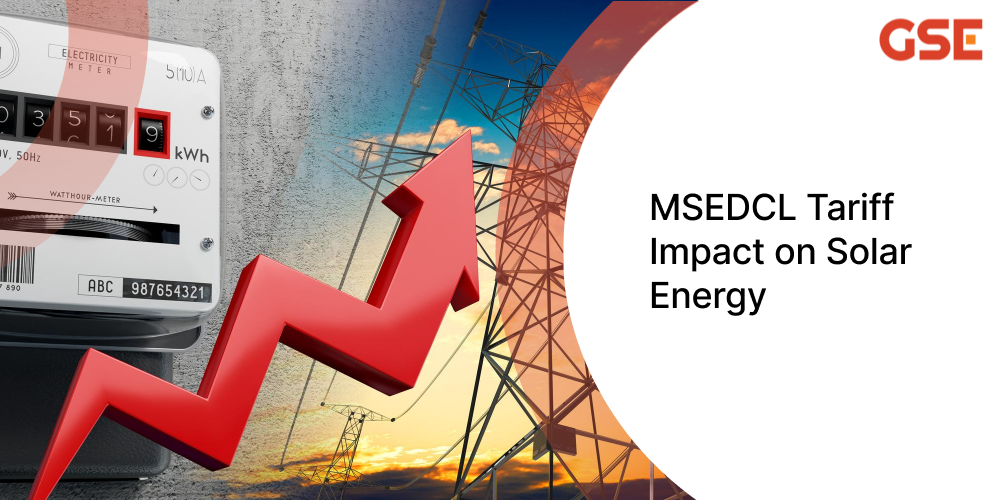500 kW Solar Power Plant Cost in Gujarat: Complete Price & Savings Guide
Nov 26

Maharashtra State Electricity Distribution Company Limited (MSEDCL) has proposed changes in the Time-of-Day (ToD) tariff from current ToDs. These proposed changes are creating concerns among current consumers of renewable energy power along with those who are planning to set up solar & other renewable energy power investments in the state. These new changes bring financial, regulatory, and investment challenges. The proposed changes will also have a ripple effect on the budding solar industry in Maharashtra. Commercial & Industrial (C&I) segments have been facing increased energy costs for the past couple of years. If we add up reduced solar incentives per unit, then the C&I segment will have to bear higher costs of electricity in their future energy bills. This article discusses the concerns of C&I consumers and industry stakeholders.
Proposed changes in Time-of-Day (ToD) tariff from current ToDs are shown in the table:
| ToD zone | OLD | PROPOSED | |||
| ToD timing slot | Current Rate (in Rs.) | ToD timing slot | Rate (in Rs.) | (FY 2025-26) | |
| Industrial | Commercial | ||||
| A | 00:00-06:00 & 22:00-24:00 (N. OP) (rebate) | 1.5 | 22:00-06:00 (N.Pk) | 1 | 0.9 |
| B | 06:00-09:00 & 12:00-18:00 (Pk) | 0 | 06:00-09:00 (M.Pk) | 1.15 | 1.25 |
| C | 09:00-12:00 (M. Pk) | 0.8 | 09:00-17:00 (OP) (rebate) | -2.15 | -2.15 |
| D | 18:00-22:00 (E. Pk) | 1.1 | 17:00-22:00 (Ev. Pk) | 1.3 | 1.4 |
The revised ToD tariff also affects industries and businesses, particularly those relying on open access solar energy as well as rooftop solar net metering systems.
The revised solar electricity tariff structure is leading to increased operational expenses for businesses, which will affect the profitability of the C&I segment. Discounts provided for daytime (9am-5pm) will certainly help industries to save on power bills to a certain extent, but they will also have to shell out higher per-unit charges for night off-peak (10pm-6am) ToD slots and other peak ToDs.
Owning solar or other renewable energy projects helps industries to reduce operational costs, as usually the cost of production of such energy is far less than the grid power. Additionally, the uncertainty around tariffs is causing hesitation from investors, slowing down interest in solar & renewable energy investments.
These proposed changes will also have an effect on developers of renewable energy who sell renewable energy through Power Purchase Agreements (PPAs). A lesser solar offset value per unit will make the PPAs unviable for renewable energy power buyers.
Slowing down demand for renewable energy power due to higher dependence on grid power may have consequences for India’s environmental goals.
1. Industries & Commercial Users
2. Solar Developers & EPC players
Slower solar adoption is delaying clean energy goals, increasing emissions, depleting natural resources, and limiting installable capacity of renewable energy, hindering India’s renewable targets.
Many businesses, consumers may face challenges due to the ToD tariff structure revised for renewable energy by MSEDCL. Increase in electricity bill costs, fluctuations in solar electricity tariff, & reduced financial incentives risk slowing India’s transition to solar energy. If changes are not made in policy, the growth of the solar industry may slow down as they depend on fossil fuels to achieve yearly goals & be competitive in the Indian clean energy market. So it’s most important that these concerns need to be addressed through policy reforms and industry collaboration so that using renewable energy will be the best solution for any type of consumer.
As a leading solar company in India, GSE renewable offers proposed solar power tariff plans for commercial & industrial consumers to achieve their business goals & reduce the electricity cost. Connect with us to get more information about solar electricity tariff plans for year 2025-26
Disclaimer: This blog post is based on preliminary research on draft MYT order by MERC and MSEDCL’s petition. Final rates may differ subject to regulatory approvals. Always refer to the official tariff order for the most accurate, up-to-date information. All the views expressed above are personal opinion of the author of this blog.
Our Blogs With a combined experience of over 250 years and the successful management of 30 MW of solar energy projects, GSER offers the most efficient solutions. 500 kW Solar Power Plant Cost in Gujarat: Complete Price & Savings Guide What is a 500 kW...
Read MoreOur Blogs With a combined experience of over 250 years and the successful management of 30 MW of solar energy projects, GSER offers the most efficient solutions. Why Solar Power Is Booming in Gujarat for Businesses Over the last decade, Gujarat has become one of...
Read MoreOur Blogs With a combined experience of over 250 years and the successful management of 30 MW of solar energy projects, GSER offers the most efficient solutions. Solar Opex Model: For Rooftop Solar with No Upfront Investment What is the OPEX Model in Solar Energy?...
Read More